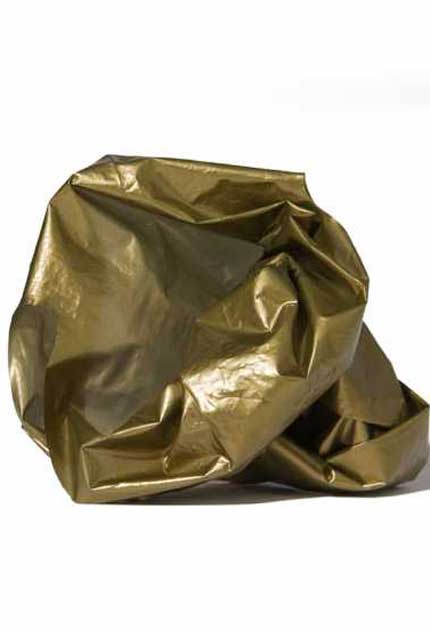Dodi Reifenberg: See how you feel..., Maddox Arts, London

No single item has come to represent our wastefulness like the plastic bag, scudding down wind-blown streets and country lanes, the enemy of landfill sites and wildlife. Dodi Reifenberg, an Israeli-born artist living in Berlin, takes the plastic bag as his starting point and his medium.
He has three main genres: portraits, stitched works and sculpture. He cuts the bags into slivers of micro-mosaic, which he sticks down to build his meticulous portraits based on photographs. The result is like a marriage between Kurt Schwitters and Roman tessellated tiling. His sombre portrait of Barack Obama shows the new President emerging from the left-hand side of the picture space into an inert field of empty black plastic, eyes downcast as if contemplating the enormity of his task. The muted tonalities of his portrait of Virginia Woolf reveal her introversion; in contrast, his portrait of Dr Wangari Maathai, the activist who, in 2004, became the first African woman to receive the Nobel Peace Prize, is colourful and flamboyant.
Most potent is the large portrait of Walter Benjamin, the quintessential Berlin Jew, who stares out at the viewer from one lens of his glasses, the other half of his face seemingly obliterated. Benjamin's own Arcades project (a montage of reflections on the commodification of things and the fragmentation of modern life) renders him the perfect subject to be fashioned from the discards of consumerism.
Plaiting and weaving provide the methodology for works such as SCAN (2008), where the coloured areas of the woven surface reflect those taken from a brain scan of someone in love. Elsewhere, weaving and plaiting have been used to create sculptural works with art-historical references, such as Soutine Schinken (2003), which acknowledges Chaim Soutine's painting of a side of beef, and Bacon's Bacon (2007), conjuring a similar meaty quotation.
Reifenberg collects plastic bags wherever he can, even asking friends to help. One work, a chicken wire and wooden container, stands in the gallery holding discarded plastic bags, to which the visitor is invited to contribute. Collage and the appropriation of non-art materials is not new, but Reifenberg's clever use of the most disdained object of modern consumption gives it a 21st-century context.
To 7 March (020-7495 3101)
Join our commenting forum
Join thought-provoking conversations, follow other Independent readers and see their replies
Comments
Bookmark popover
Removed from bookmarks